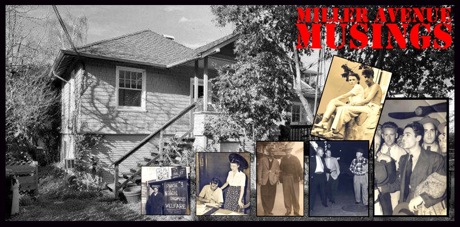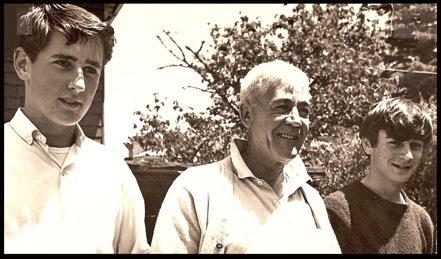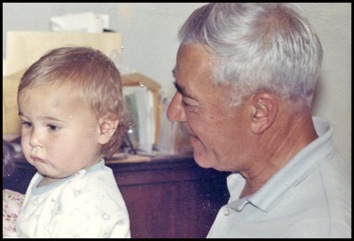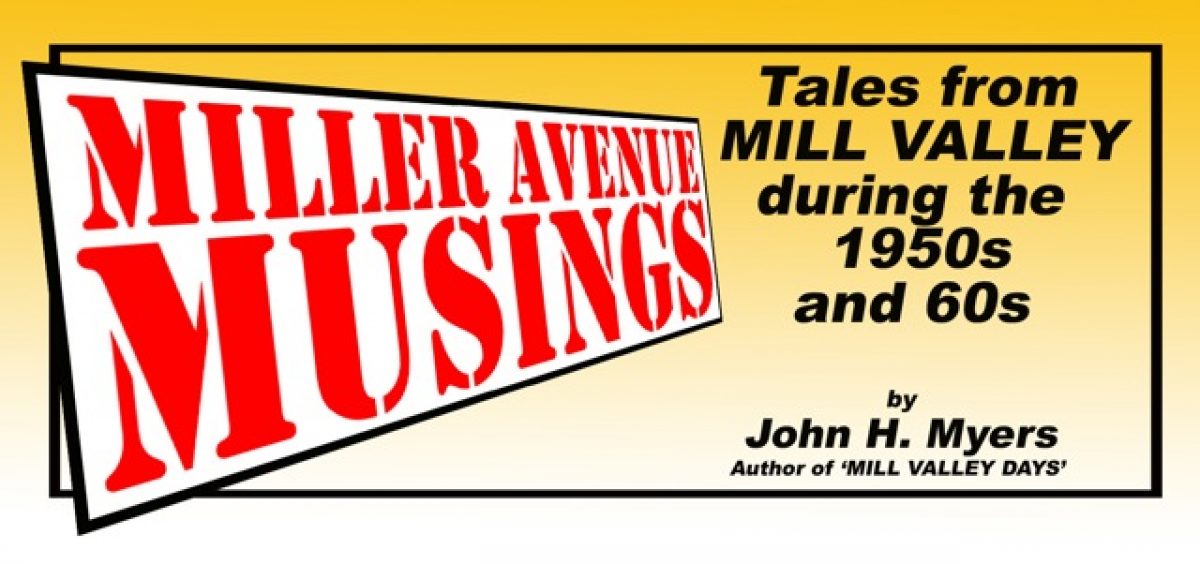
Blackie and the Gunsel
During the 1950s our father Blackie was not at all the typical American dad. His values and attitudes were rooted in the 1930s and 40s and his firm belief in socialism put him at odds with the political mainstream of the society we were growing up in.
Black used profanity in a very colourful way. He swore effectively and often humorously. In fact, when it came to entertaining his four children, he was a pretty accomplished comedian. There was a dog who followed my brother Jim and I home from school and adopted us. It was a beagle from down in Homestead Valley and it slept, for about a week, on the old sofa which sat out on our front porch at 10 Seymour.
So one Saturday morning, my brother Jim and I were riding with Blackie up towards San Rafael. As our Plymouth station wagon climbed up Highway 101 on the approach to Corte Madera, Blackie said: “Hey guys. That dog’s gotta go.”
“Why Blackie?” one of us asked from the back seat.
“Well this morning I came out on the porch,” he said in his calm and even voice. “And the dog’s sitting there. He looked up at me and said: ‘Hey Black. F–k you.'”
There’s a kind of laughter which is silent. It’s silent because the person is laughing so hard that they cannot make a sound. This was precisely the kind of laughter which consumed my brother Jim and I at hearing Blackie’s punchline. We crumpled, literally, onto the floor in the back seat of the car.
Profanity, during the 1950s was not, as far as I could make out, tolerated in polite society. Grown men tended to swear and tell dirty jokes in the presence of other grown men but not around women and certainly not children. Hollywood movies would occasionally have words like ‘Damn’ or ‘Hell’ but nothing stronger.
My parents and their close friends were very different in this regard. There was never any great taboo about swearing over at the Dreyfus’s or up at the Hallinans. Vin Hallinan was a highly educated man who swore like a stevedore.
Yet however amusing Vin or Blackie’s use of profanity was, I was under no illusions about the society I was growing up in. I was always careful never to swear in front of any adults outside my parents’ circle of close friends.
Children at this time were, in my opinion, second class citizens. The adults in all the stores in downtown Mill Valley, with the exception of Village Music, regarded most children with suspicious contempt. I suppose the main suspicion was the possibility of shoplifting.
There were also many activities which children were strictly not allowed to participate in. Smoking, drinking, driving and voting were all things that big people did. I was definitely not happy being a child. All my role models were adults and I longed to be amongst their number.
So, though my parents and their friends definitely did not treat us like second class citizens, it did seem like that was the fate of most of my friends at school. It was a very strict time. Corporal punishment was common and many of my friends received regular spankings at home as well as at school. Many times I heard angry adults in a public place shouting at their kids: “Just you wait ’til I get you home!” I’m sure this was why the behaviour at the Saturday matinee was so raucous because suddenly there were no adults around except for the flashlight wielding ushers and it was possible, for one afternoon, to break out.
It’s probably difficult for younger people now to comprehend what it was like growing up in Mill Valley in the 1950s. In many ways society has changed for the better. There were so many taboo subjects back then which people in general and children specifically did not discuss in public. The swear words which were not to be uttered within earshot of adults were fairly specific and the realities which each of these words represented were off limits too. Defecation, fornication and urination were not subjects to discuss which is why kids relished time away from adults so all this ‘dirty talk’ could flow without any censorship.
So Blackie held a particular charm for his children as he didn’t subscribe to any of those attitudes which were so prevalent in mainstream society. He spoke using nicknames and had one for everything, never describing anything in a conventional way. A rich person was candlestick, a child was a breadsnapper, a tourist was a scenery bum…the list was long indeed. Being a sailor was probably the biggest influence on the way he used language though growing up in Brooklyn must have been an equally strong component.
In the 1941 movie The Maltese Falcon, Humphrey Bogart’s Sam Spade is heard referring to Elisha Cook Jr. as a gunsel. The same expression was used by Dashiell Hammett in his 1929 novel which the film was based on. If you google the word ‘gunsel’ you will find that it means a criminal carrying a gun, derived from the Yiddish word gendzel or little goose. It also denotes a homosexual youth.
Now Blackie used the word gunsel a lot and it was not a term of endearment. If someone was a gunsel they were stupid or inept. The word however had a different meaning for him then what I found on Google. In the early 1960s when we had moved down to Catalpa Street he told me the seafaring origins of the word.
“In the early days of warships,” he explained, “They had a terrible time moving cannons around the decks. So somebody came up with the idea of putting a sail on each cannon in the hope that the wind would move these big guns.”
At this point I looked at him quizzically as if to say ‘would they?’
“What do you think Jack? Could a sail full of wind move a cannon that probably weighed a ton?” It took me a moment to realise it wouldn’t.
So, according to Blackie, the Gun Sail became a sailor’s expression for a stupid idea and in time a stupid person. In the way of nautical jargon it was ultimately abbreviated to gunsel like forecastle became foc’sle.
He also told me what a geek was. When Bob Dylan’s LP Highway 61 Revisited came out in 1965 there was a line in Ballad Of A Thin Man about buying a ticket to go see the geek. Blackie told me that every travelling carnival used to have a geek which was a person who was kept constantly drunk. People would pay money to laugh at the Geek. Of course the modern use of this word has nothing to do with these historic carnie origins but practically every expression that Black used had a proper definition. A ‘Laughing Academy’ was how he described a mental hospital. A ‘Dildock’ was someone who didn’t know what they were doing and a person who was wasting their time was ‘F–kin’ the dog.’
Swearing in our household was not excessive. Beth rarely swore and Blackie only ever used the F word when he lost his temper or when it could be put to comical effect and his timing in that department was impeccable.
Also we didn’t use profanity in a literal sense in our family. Calling someone a ‘son of a bitch’ was never a comment on their mother and ‘bastard’ did not denote illegitimacy. They were simply colourful and effective words and phrases.
Several of the famous people that Black knew back in New York when he was a vice president of the National Maritime Union were not of particular interest to me until later in life. He knew Billie Holiday, Woody Guthrie and Paul Robeson. When Woody Guthrie died, Blackie was asked to speak at a service held in San Francisco and I remember him telling me that Pig Pen of the Grateful Dead was sitting in the front row.
The actor Walter Matthau who we have come to think of as a comedian, was actually, throughout most of the 1950s and early 60s, a serious heavy, playing villains in the movies and didn’t become known as a funny guy until pretty late on. So it was well before The Odd Couple when it came up that Blackie knew him. He said that he was the funniest man he’d ever met and that he could reduce a room full of people to tears of laughter just by keeping a straight face.
I recently watched the feature film Woodstock all about the famous music festival in the late 1960s. It was a fairly nostalgic experience seeing the San Francisco bands, many of whom I knew from my days working for Bill Graham at the Fillmore. One thing which stood out, however, was the artless use of profanity, particularly the F word. So casually was it thrown around in the stage announcements that it lost any power and, quite frankly, became very boring to hear along with the word ‘man.’



By the time of the psychedelic years I had long hair and was a hippy. Blackie hated long hair on men and certainly didn’t have a good opinion of drugs. He was, like most of their close friends, entirely opposed to the war in Vietnam but stylistically he remained aloof from the protests against it.
The poet Lew Welch was a good friend of Black’s and came over to the house on Catalpa a lot during that time. He would try his damndest to convert him to what he described as ‘the movement’ but Blackie would just smile and nod.
On one visit Lew told him all about the anti-Vietnam war demo that the Hell’s Angels had tried to break up violently in Berkeley. Allen Ginsberg had gone to see Sonny Barger, the leader of the Angels and said: “What are you doing man? I thought you were rebels and here you are beating these kids up.” According to Lew this was the beginning of a truce between the Angels and the anti-war movement.
Blackie’s attitude to all the well publicised protesting which was happening over on the Berkeley campus was that the students, who he agreed with politically, had no bargaining power and therefore no means of achieving their goals. He viewed politics through the prism of trade unionism.
Stylistically Blackie did not bend with the times. It was this stoic quality which probably helped him through the blacklist years. Though the federal government had made it practically impossible for him to earn a living on the east coast he didn’t seem to bear a grudge about it. He did despise certain politicians like Ronald Reagan and Richard Nixon but he never lost his considerable faith in human nature. He always had a smile and a joke for the people on the checkout at Safeways and his conviction that socialism was ultimately the answer to society’s ills never deserted him.
I know I’m not unique in missing my parents but I do wish I’d become as interested in their history then as I am now. But sadly I don’t think that’s the way life works.

https://www.amazon.com/dp/B085QN73VQ
Amazon UK
https://www.amazon.co.uk/dp/B085QN73VQ

Brilliant…as always; full of insight and interest. And I agree, that often we come to realise the importance of our parents’ stories far too late. And what a lovely photo of you three and a great one of Blackie with Michael…I hadn’t seen that before.
LikeLike
Hi John,I remember enjoying listening to your memories of growing in Mill Valley at Nells way back when.I was lucky enough to meet Blacky and Beth at Nells .Like you he told a great story.I remember going with Trevor and Blacky to West Ham vs Spurs He was very amused by the singing and banter between the rival fans.
LikeLike
Thank you for that Kevin.
LikeLike